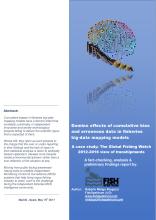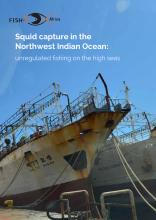Domino Effects of Cumulative Bias and Erroneous Data in Fisheries Big-Data Mapping Models - Case Study of GFW View on Transshipments - FishSpektrum
Without a Worldwide Unique Vessel Identifier (WUVI) database, the International community has largely relied on data in self-created combined vessel lists for spatiotemporal mappings of fishing presence, effort, and footprint. Projects match fishing vessel registration identifiers to their alleged AIS MMSI numbers using these vessel lists. This study aims to prove that this method has yielded a large number of erroneous ship identification references. Global Fishing Watch, one of the largest vessel identification projects, is crosschecked with the vessel data that the study gathered and found that it suffers from major flaws and biases. Such errors put at risk both the creditability of the GFW and private/independent fisheries monitoring control & surveillance (MCS) initiatives. Not only should projects use more scientific responsibility, but a worldwide database could also help end the data-gathering methods that brought these mistakes about.
Topic
Language

